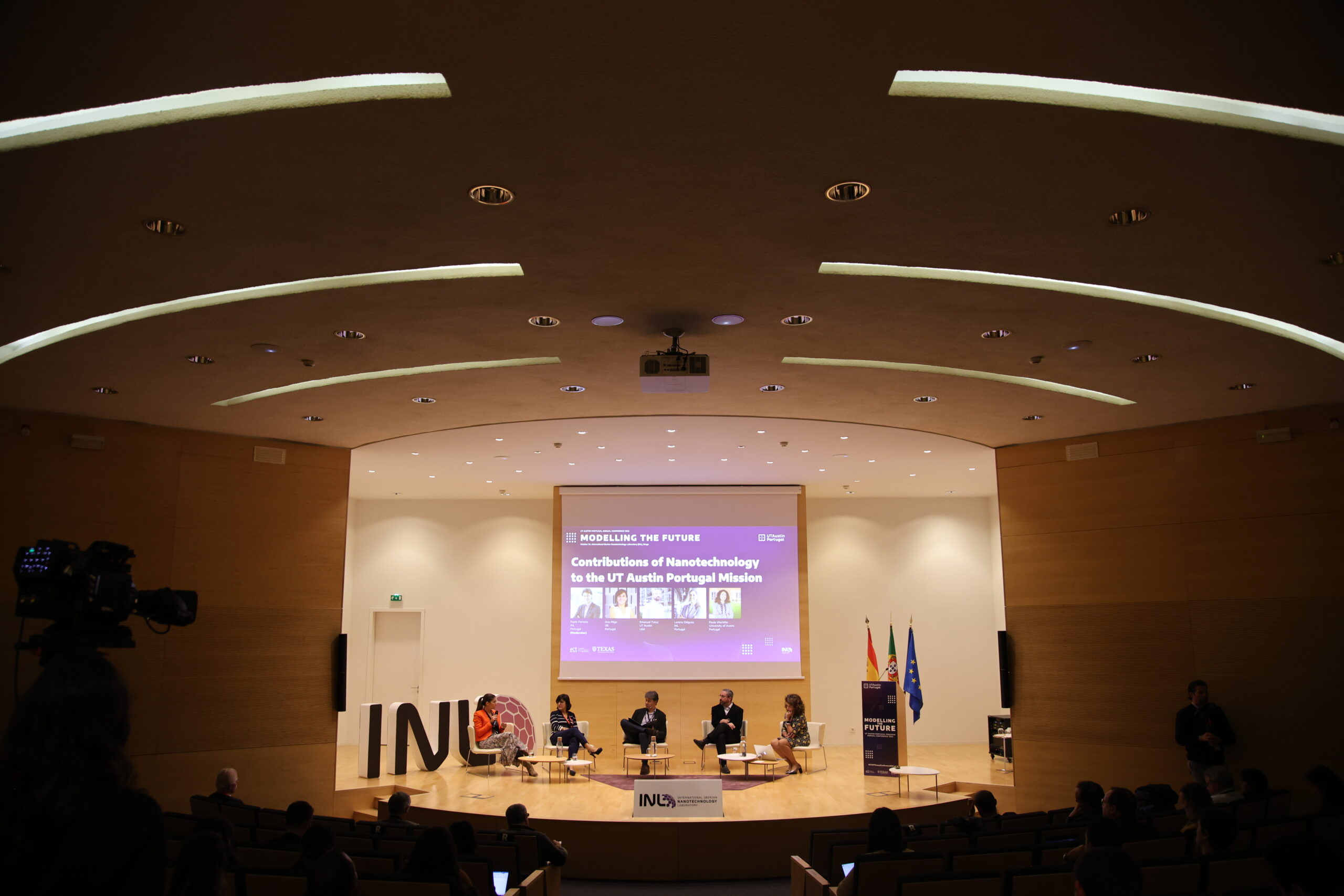How can science shape the future? This question is increasingly present in today’s discussions, as there are unavoidable global challenges, like climate change and the energy crisis, that force us to act immediately, to change our destiny.
On October 24, we gathered our transatlantic community at the International Iberian Nanotechnology Laboratory (INL) to answer this question during the UT Austin Portugal Program Annual Conference. This was the last conference of phase III of the Program; therefore, it constituted a moment to explore the Program’s future and role in addressing the challenges Portugal will face in the upcoming years.
To this end, we promoted a day full of discussions on various topics, including energy, nanotechnology, and advanced computing – welcoming over 100 participants.
The day began with words from the host institution, represented by Paulo Freitas (Deputy Director-General of INL), the leadership of the Program in Austin and Portugal, John Ekerdt and José Manuel Mendonça, and by the Portuguese Foundation for Science and Technology, represented by António Bob Santos (member of the Board of Directors). All statements encouraged the community to seize the day to reflect on the Program’s accomplishments while discussing what it can bring to the future.
Reflect on the past with the eyes on the future
The Program’s External Review Committee (ERC), represented by its Chair Peter Arzberger, reflected on the Program’s activities and impact on the scientific and technological ecosystem. Peter highlighted the Program’s important role in the Portuguese High-Performance Computing landscape – namely, the creation of the Minho Advanced Computing Centre (MACC). Thanks to the collaboration with the Texas Advanced Computing Centre (TACC), it was possible to install the first supercomputer in Portugal – BOB – a milestone that allowed Portugal to become part of the EuroHPC JU and, more recently, to host Deucalion – the European High-Performance Computing Joint Undertaking supercomputer located in Portugal.
After this reflection, Peter also discussed how the Program can optimize the results of the work carried out over 16 years: take advantage of the trust that has been built to keep collaborating in strategic areas where the partnership provides a unique contribution and translate the aggregate progress into benefits for the Portuguese economy and health.
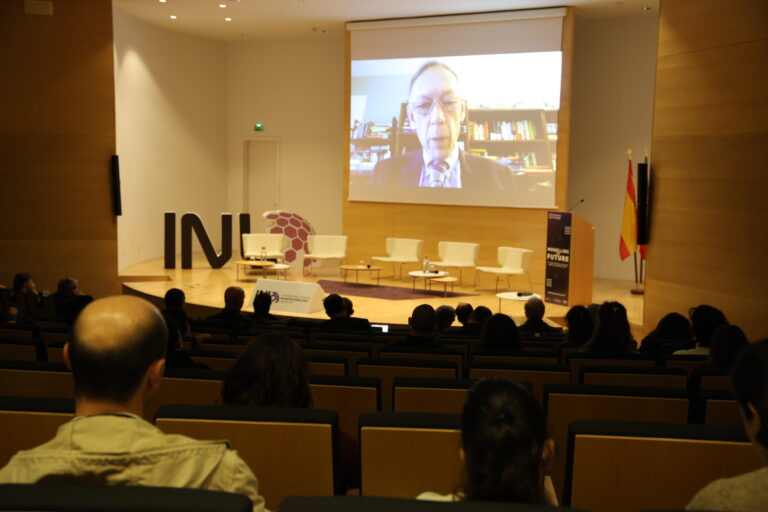
“You need to keep articulating the value of the activity and the uniqueness of the collaboration so that the Portuguese taxpayer, industry, research community and the government can understand.”
– Peter Arzberger
Energy, Nanotechnology and Advanced Computing: how can they complement each other?
To discuss the role of science in the future that we ambition, we brought together experts from academia and industry from Portugal, Spain, and the US for a series of talks and round tables on areas that respond to emergent global challenges: energy, nanotechnology, and advanced computing.
John Ekerdt’s keynote talk, chaired by Killian Lobato (Assistant Professor at the Faculty of Sciences of the University of Lisbon), focusing on “Our Energy Future”, emphasized the crucial need for energy security and equity. He highlighted the vulnerability posed by international conflicts and stressed the urgency of sustainable energy use in the face of escalating climate threats. Drawing on energy data from the US and Portugal, Ekerdt commended Portugal’s commitment to renewable energy. He particularly emphasized Green Hydrogen as a critical technology for the future, citing its potential in addressing the intermittency of power from renewables. Ekerdt urged collaboration to help Portugal and Texas achieve carbon neutrality and renewable energy goals.
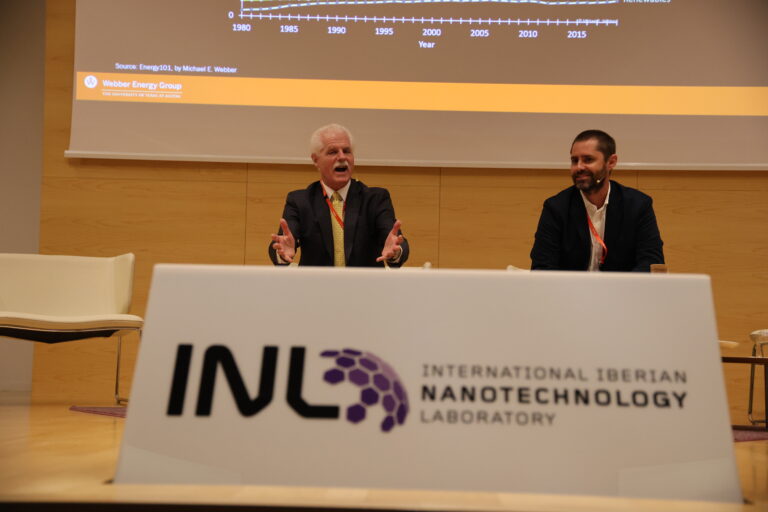
“If we mobilize the competencies in Portugal and in UT Austin, and we couple education and research missions with innovation, then our goals of decarbonizing and becoming leading renewable centers that have renewable energy based around hydrogen can be achieved.”
– John Ekerdt
Synergies between Portugal and Austin continued throughout the round table on clean energy, moderated by António Vidigal (UT Austin Portugal’s Representative of Industrial Advisory Board), which brought together experts from academia and key players in the energy sector. The discussion mainly involved how advanced computing and nanotechnology can help develop the field.
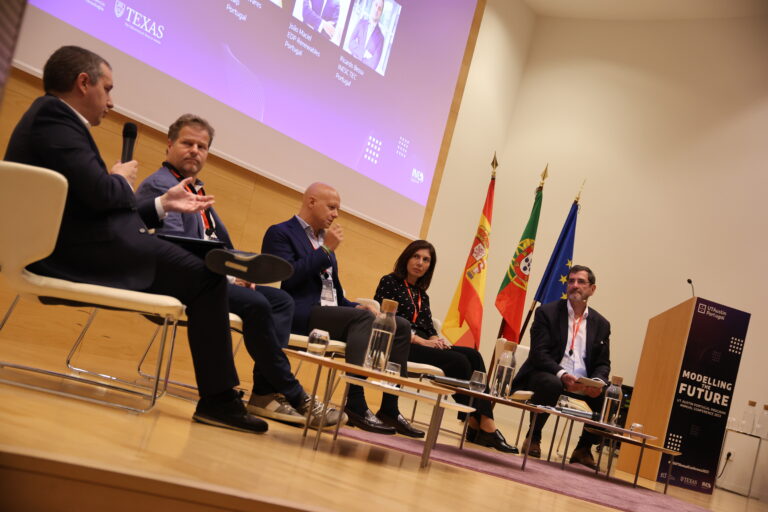
Speakers shared that high-performance computing (HPC), artificial intelligence (AI), and computational fluid dynamics (CFD) models can be integrated to evaluate and optimize energy resources and to address corporate limitations in energy transition. Nanotechnology emerged as essential to develop cheaper, more efficient, and sustainable photovoltaic materials and offshore wind foundations – fostering a circular economy with reduced waste and recycling. The conversation extended to exploring ways to enhance energy equality in developing countries through local community involvement, mini-grids, and remote sensing. Key areas such as green hydrogen and collaborative decarbonization were also highlighted.
To reflect on the importance of the UT Austin Portugal Program in establishing collaborations and fostering innovation in nanotechnology, we got together several members of our community, including Principal Investigators and Area Directors, in a session moderated by Paulo Ferreira (UT Austin Portugal’s Area Director for Nanotechnologies). The Program’s impact on Portugal was yet again mentioned, namely the way it contributes to knowledge exchange and network development. The speakers also highlighted how nanotechnology plays an important role in this partnership, as UT Austin has a well-established multidisciplinary research environment, fostering collaboration, tech transfer, and training of the next generation of researchers, from which Portugal can greatly benefit.
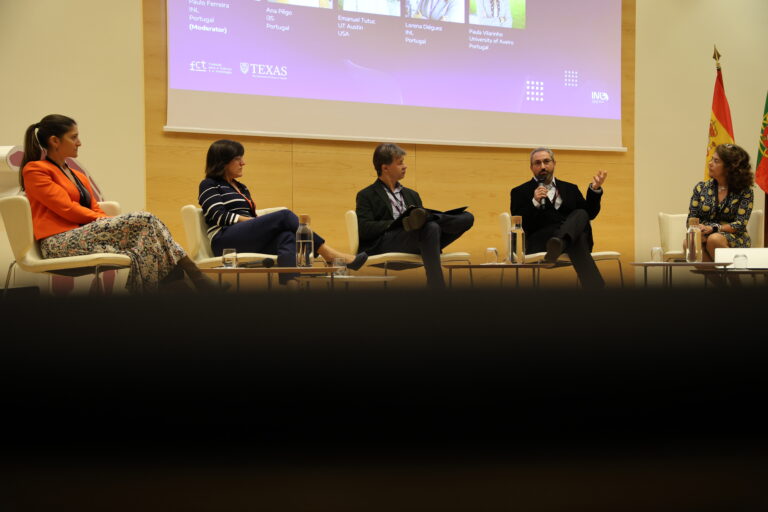
Challenges like data protection, and intellectual property in the context of international collaborations were discussed, since creating common ground in collaborative projects is important but takes time. In the future of nanotechnology, the experts agreed that semiconductors and advanced computing will play major roles, especially in materials design and biomedicine; but the need for talent development is crucial to make that happen. Projects funded by the Program, such as SENTINEL, were mentioned for already incorporating machine learning algorithms to process data for cancer applications.
The round table on advanced computing, moderated by Nuno Castro (Vice-President for Research and Scientific Innovation of the School of Sciences of the University of Minho and UT Austin Portugal’s Area Director for Advanced Computing), explored its current and future applications across various domains. The audience was prompted to consider where advanced computing could make an impact, encompassing emerging topics like AI in energy and extending beyond the realms of exact sciences, such as social sciences, arts, and politics.
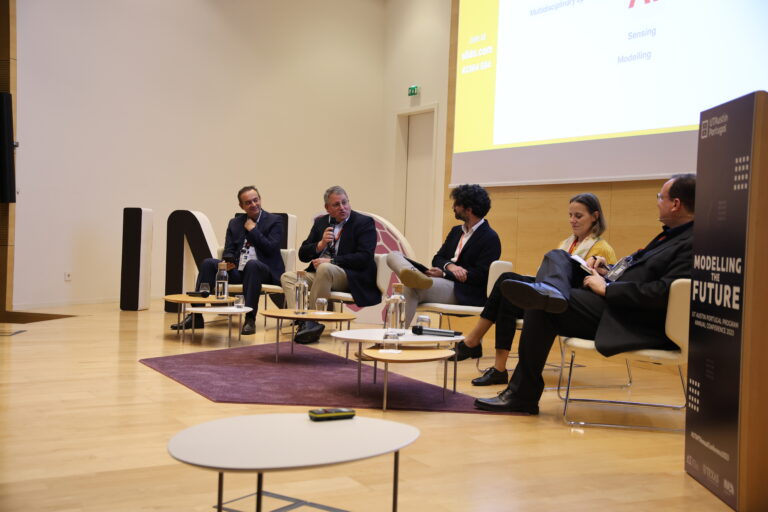
Collaborations were deemed crucial for developing the necessary infrastructures to explore AI, with a focus on addressing the costs associated with creating new models. The session emphasized the role of the Program in training individuals in advanced computing through partnerships, and discussed how the private sector could benefit from such advancements and maintain competitiveness in the business landscape. Additionally, optimizing energy usage through advanced computing was explored as a practical application.
There was a common theme across all the talks and round tables: international collaboration is crucial to advance science and innovation in the name of the common good.
Cooperation between US and EU: what does it hold for the future of science and technology?
To enlighten the audience on what efforts the US and EU have been making to better cooperate in science and technology, we invited Amal Haynes (American diplomat at the U.S. Department of State in the Science and Technology Cooperation Office of the Bureau of Oceans and International Environmental and Scientific Affairs).
The US and EU have been collaborating throughout the decades to establish diplomatic relations. However, to put science in the diplomacy equation has been relatively new. Amal explained how both regions recognize the importance of expanding collaborations on several fronts, e.g., AI, quantum computing, and clean energy, and how they defined some key focus areas for strategic cooperation, such as climate, cancer, earth observation and circular economy. Amal also left some remarks on how international partnerships are crucial to working towards these strategic goals.
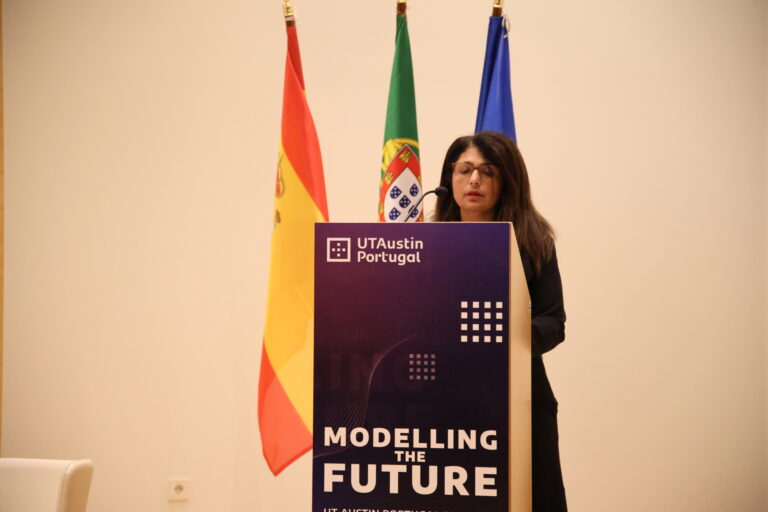
“This program stands as an ideal example of the US/EU cooperation model”
– Amal Haynes
Besides the presentations and discussions, the Conference promoted networking moments and gave visibility to our transatlantic community research under the E-Poster exhibition. There were more than 30 e-posters, tackling fields such as advanced computing, nanotechnology in health and energy, medical physics, and space-earth interactions. The E-Poster Gallery is also available on our website.
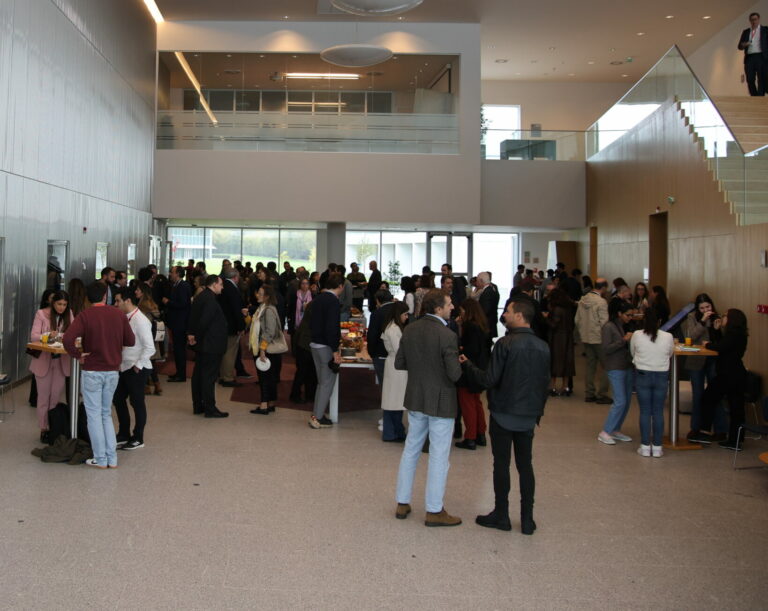
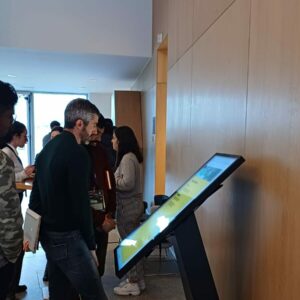
After a day marked by the exchange of experiences and knowledge, the answer to the initial question was clearer. Science and technology are constantly evolving in response to emerging challenges, but there is something that must remain constant, both in the present and in the future: cooperation between nations. “In this conference, we brought together our transatlantic community to ideate the future. From the discussions we promoted on Energy, Nanotechnologies and Advanced Computing, we realized that the future is packed with challenges but also opportunities. It became clear that the bond we have been nurturing over the last 16 years will be crucial, not only to exploit the scientific outcomes of our exploratory and strategic projects but also to continue to address the challenges Portugal, Europe and the U.S are facing. We believe these connections will stand the test of time”, says UT Austin Portugal’s National Co-Director Rui Oliveira.
By taking advantage of each country’s technological, economic, or knowledge-based strengths and bringing academia and industry together, we can more efficiently work towards solving the most pressing and borderless challenges. “Through the Program, we were able to combine forces between Portugal and Texas to develop state-of-the-art research, promote innovation and economic spillovers, and support the education of future leaders. The outcomes may not be immediate but will eventually create a long-lasting impact in Portugal and globally for the years to come”, adds Marco Bravo, UT Austin Portugal’s Executive Director in Austin.
Browse through the Photo Gallery to relieve the moments of our Annual Conference.
